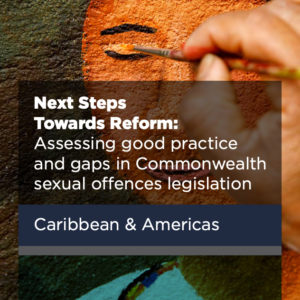In The Bahamas, sexual offences law are found in the Sexual Offences and Domestic Violence Act 1991 [Chapter 99] (SODV), as amended. The Evidence Act 2006 [Chapter 65] (EA) contains relevant evidentiary law for all sexual offences, including on the admissibility of evidence of past sexual history of sexual assault complainants.
The provisions of the SODV Act in some respects meet the good practice and human rights standards, including having gender-neutral offences and a comprehensive definition of sexual assault covering penetration of all orifices by any body part or object. Most moralistic terminology has been removed.
Other aspects of the provisions, however, do not accord with good practice and some international human rights standards and require reform. For example, marital rape, inappropriately termed ‘sexual intercourse without consent by a spouse’, is not an offence unless the parties are formally separated or divorced or a domestic violence protection order is in place. Additionally, rules of evidence such as a requirement for corroboration and enabling the sexual history of the complainant to be admitted in some circumstances should be reformed. Although there are gender-neutral child sexual assault offences there are no close-in-age exceptions. The age of consent to heterosexual sexual activity is 16. The Bahamas continues to criminalise sexual activity with people with disability regardless of whether they give free and voluntary consent.
A number of reforms to address weaknesses in the SODV have been prepared, however they had not been enacted at the time of writing. In its Concluding Observations on The Bahamas in 2018, the CEDAW Committee urged it to enact the reforms.
The Bahamas has partially decriminalised same-sex sexual activity. Consensual same-sex sexual activity between people over 18 in private is not a crime. However, same-sex sexual activity for people under 18 years is still a crime even when it is consensual. This contrasts with heterosexual sexual activity for which the age of consent is 16. This is discriminatory and does not meet human rights compliant good practice standards. Discriminatory ages of consent have been held by courts in other jurisdictions, such as Canada, Hong Kong and South Africa, to be unconstitutional.
The Bahamas is a state party to relevant international and regional human rights treaties, including the Inter-American Convention on the Prevention, Punishment, and Eradication of Violence against Women (Convention of Belém do Pará), UN Convention on the Elimination of All Forms of Discrimination against Women, Convention on the Rights of the Child, Convention against Torture and Other Cruel Inhuman or Degrading Treatment or Punishment, Convention on the Rights of Persons with Disabilities and International Covenant on Civil and Political Rights.
The full assessment of The Bahamas is available here.



